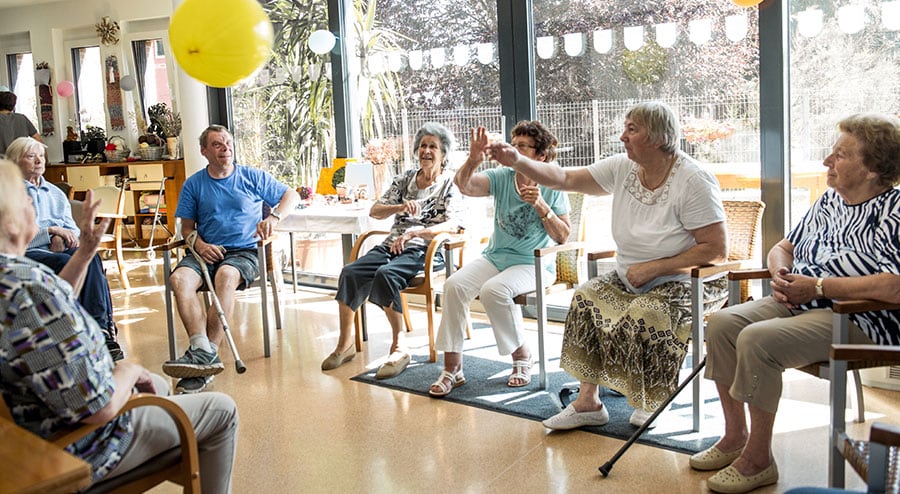Find pet-friendly Assisted Living facilities for seniors who love animals.
Find pet-friendly Assisted Living facilities for seniors who love animals.
Blog Article
The Role of Assisted Staying In Providing Specialized Look After Mental Deterioration Clients
The provision of specialized treatment for mental deterioration clients within assisted living facilities is significantly identified as a crucial component of reliable mental deterioration administration. These environments are made to resolve the distinct cognitive and emotional obstacles dealt with by people with dementia, offering customized support that advertises security and well-being.
Comprehending Mental Deterioration Care Requirements
Recognizing the treatment requirements of people with mental deterioration is critical for offering efficient support and improving their lifestyle. Mental deterioration is a modern neurological condition that influences cognitive functions such as memory, thinking, and communication. Individuals with dementia usually need aid with everyday activities, individualized care strategies, and psychological support.
Efficient mental deterioration treatment involves identifying the unique difficulties encountered by each individual. This includes comprehending the phases of dementia, which can vary from moderate cognitive problems to innovative phases needing thorough support. Treatment requires may encompass support in taking care of day-to-day regimens, drug adherence, and maintaining social interactions to stop seclusion.
In addition, sensory excitement and familiar settings can considerably improve the wellness of people with mental deterioration. Caretakers have to be educated to recognize behavior adjustments and use strategies tailored to each person's preferences and previous experiences. Strategies such as recognition treatment and memory can assist interact properly and cultivate a sense of protection.
Inevitably, efficiently resolving the treatment requirements of people with dementia calls for a thoughtful strategy, recurring training for caretakers, and a commitment to maintaining dignity and regard throughout the caregiving process.
Benefits of Assisted Living

Assisted living promotes social communication amongst homeowners, fostering a sense of community and belonging. Involving with peers can relieve feelings of isolation, which are common in those living with dementia.
Furthermore, numerous nursing home use support with day-to-day tasks, such as drug monitoring, showering, and dish prep work. This assistance permits homeowners to maintain their independence while guaranteeing their health and wellness and health are prioritized. Inevitably, assisted living acts as a valuable resource, balancing treatment and freedom for people with mental deterioration and their family members.

Specialized Programs and Tasks
(Charlotte Alzheimer's Care)Recognizing the distinct requirements of people with dementia, lots of nursing home carry out specific programs and activities developed to improve cognitive function and promote overall well-being. These programs frequently include cognitive stimulation tasks that involve residents in memory video games, challenges, and reminiscence therapy, which encourages the sharing of individual tales and previous experiences.
Furthermore, art and music treatment play considerable duties in promoting creativity and psychological expression (Assisted Living). Involving homeowners in painting, crafting, or songs sessions can offer therapeutic advantages, helping to lower anxiety and boost state of mind. Exercises, such as gentle workouts and dancing sessions, are likewise essential, as they advertise mobility and physical wellness while encouraging social interaction amongst residents
Organized daily routines are often established to give a sense of security and predictability for individuals with dementia. These routines can consist of scheduled meal times, group activities, and individualized treatment plans that provide to specific passions and capabilities. By developing an enriching atmosphere loaded with customized activities, helped living facilities not only enhance the lifestyle for dementia clients but also foster a feeling of area and belonging.
Trained Personnel and Support
(Assisted Living Charlotte)In helped living facilities, the visibility of skilled staff is critical for offering reliable support to people with dementia. These specialists possess specialized expertise and skills to attend to the unique requirements of residents, guaranteeing their safety and security, comfort, and wellness. Personnel get training in mental deterioration care, that includes understanding the progression of the condition, identifying behavioral adjustments, and employing reliable interaction techniques.
Furthermore, skilled personnel are geared up to implement personalized treatment strategies tailored to every citizen's preferences and abilities. This personalized approach cultivates a feeling of freedom and dignity, permitting homeowners to participate in significant tasks that enhance their high quality of life. The team additionally play a crucial function in keeping track of wellness and health, immediately identifying any type of adjustments in condition that may require medical attention.
In enhancement to direct care, experienced personnel provide psychological support to locals, aiding to relieve feelings of complication and stress and anxiety that commonly go along with mental deterioration. Their thoughtful strategy produces a caring atmosphere where citizens really feel valued and comprehended - Assisted Living. Eventually, the competence and commitment of qualified team are essential in delivering extensive treatment that satisfies the intricate needs of individuals coping with dementia in assisted living settings
Family Involvement and Resources
Family members participation plays a considerable function in the care of individuals with mental deterioration in assisted living facilities. Involving member of the family in the treatment procedure not just improves the emotional wellness of the homeowner however also promotes a joint atmosphere where care strategies can be customized to specific needs. Families can supply beneficial insights into the preferences, background, and behaviors of their liked ones, which can educate caretakers and result in even more personalized treatment strategies.
Furthermore, assisted living facilities frequently use resources for households, such as support system and instructional workshops. These resources can aid households understand mental deterioration, boost communication techniques, and establish coping devices. Participation in these programs can equip household participants, equipping them with the tools essential to sustain their enjoyed ones effectively.
In addition, routine interaction between family members and personnel is essential. This ongoing discussion allows family members to stay notified about their loved one's progression and any kind of modifications in care strategies. Eventually, a strong partnership in between households and learn the facts here now aided living facilities cultivates a setting of trust fund and understanding, making certain that individuals with mental deterioration obtain the specialized treatment they are entitled to while preserving their family members connections.
Final Thought
In verdict, assisted living centers play a vital function in attending to the one-of-a-kind needs of dementia clients with customized treatment and support. By promoting safe settings, advertising social communication, and executing organized routines, these facilities enhance the general health of locals. The involvement of qualified staff and family members better improves the treatment experience, making certain that individual preferences and backgrounds are valued. Ultimately, assisted living offers vital resources that substantially improve the lifestyle for those coping with dementia.
Report this page